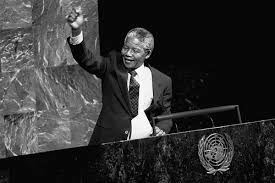The event made significant contributions to the current debates about how to accelerate the pace in overcoming South Africa’s development challenges, to eradicate poverty and to reduce inequality. The workshop also discussed practical steps towards making an impact in public discourses, policy input and the implementation of workable interventions identified.
National Workshop of the Mandela Initiative in Cape Town
Interdisciplinary work on unemployment, poverty and inequality

Nelson Mandela, the anti-Apartheid revolutionary, had been President of the African National Congress (ANC) from 1991 to 1997.
The Nelson Mandela Foundation Johannesburg, one of our partner organisations in South Africa, has been one of the convening institutions for this university-led national initiative which has been working since 2012 on strategies and projects to address unemployment, poverty and inequality in the country.
Leading academics, researchers and practitioners from civil society, representatives from public service, government, business and unions have worked collaboratively in a multitude of ways, holding workshops and action dialogues in communities, sharing examples of best practice, publishing papers, engaging political decision makers on different levels and forming communities of practice.
The workshop held at UCTs Graduate School of Business in Cape Town presented and debated outcomes of the different work streams of the initiative, introduced practical examples of cross-sector collaboration and interdisciplinary projects and discussed strategies to further implement solutions identified. Trevor Manuel, who had encouraged the forming of the Mandela Initiative during his tenure as Minister and Chairperson of the National Planning Commission, was among the many prominent participants in the three-day event.
A draft synthesis report of the multi-year project is available online. It summarises research outcomes and recommendations, and it introduces many examples of practical projects in areas such as early childhood development, health, education, youth, transport, urbanisation, informality and spatial inequality, sustainable development, rural economy and land reform, labour market and social cohesion.
